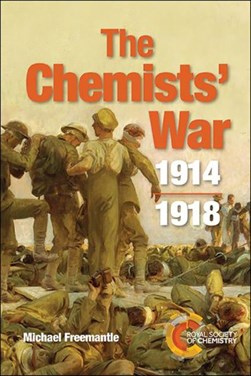-
BROWSE 1000s OF BOOKS IN STOCK
-
FREE DELIVERY ON ORDERS OVER €10
-
PRE-ORDER OBSESSED BY JOHNNY SEXTON
The chemists' war
PAPERBACK
Within months of the start of the First World War, Germany began to run out of the raw materials it needed to make explosives. As Germany faced imminent defeat, chemists such as Fritz Haber and Carl Bosch came to the rescue with Nobel Prize winning discoveries that overcame the shortages and enabled the country to continue in the war. Similarly, Britain could not have sustained its war effort for four years had it not been for chemists like Chaim Weizmann who was later to become the first president of the State of Israel. Michael Freemantle tells the stories of these and many other chemists and explains how their work underpinned and shaped what became known as The Chemists' War. He reveals: how chemistry contributed to the care of the sick and wounded and to the health and safety of troops; how coal not only powered the war but was also an important source of the chemicals needed for the manufacture of explosives, dyes, medicines and antiseptics; how Britain's production of propellants relied on the slaughter of tens of thousands of whales; how a precious metal played a critical role in the war; how poisonous chemicals were used as weapons of mass destruction for the first time in the history of warfare and how chemists developed gas masks for protection against these weapons; how the British naval blockade of Germany imperilled agricultural production in the United States. The book will appeal to the general reader as well as the many scientists and historians interested in the Great War.
€28.99

86 Reward Points
In stock online
Extended Range: Delivery in 2-3 working days
Extended Range: Delivery in 2-3 working days
Free Delivery on this item
Any purchases for more than €10 are eligible for free delivery anywhere in the UK or Ireland!
Within months of the start of the First World War, Germany began to run out of the raw materials it needed to make explosives. As Germany faced imminent defeat, chemists such as Fritz Haber and Carl Bosch came to the rescue with Nobel Prize winning discoveries that overcame the shortages and enabled the country to continue in the war. Similarly, Britain could not have sustained its war effort for four years had it not been for chemists like Chaim Weizmann who was later to become the first president of the State of Israel. Michael Freemantle tells the stories of these and many other chemists and explains how their work underpinned and shaped what became known as The Chemists' War. He reveals: how chemistry contributed to the care of the sick and wounded and to the health and safety of troops; how coal not only powered the war but was also an important source of the chemicals needed for the manufacture of explosives, dyes, medicines and antiseptics; how Britain's production of propellants relied on the slaughter of tens of thousands of whales; how a precious metal played a critical role in the war; how poisonous chemicals were used as weapons of mass destruction for the first time in the history of warfare and how chemists developed gas masks for protection against these weapons; how the British naval blockade of Germany imperilled agricultural production in the United States. The book will appeal to the general reader as well as the many scientists and historians interested in the Great War.

86 Reward Points
Any purchases for more than €10 are eligible for free delivery anywhere in the UK or Ireland!
€28.99

86 Reward Points
Any purchases for more than €10 are eligible for free delivery anywhere in the UK or Ireland!
Product Description
Within months of the start of the First World War, Germany began to run out of the raw materials it needed to make explosives. As Germany faced imminent defeat, chemists such as Fritz Haber and Carl Bosch came to the rescue with Nobel Prize winning discoveries that overcame the shortages and enabled the country to continue in the war. Similarly, Britain could not have sustained its war effort for four years had it not been for chemists like Chaim Weizmann who was later to become the first president of the State of Israel. Michael Freemantle tells the stories of these and many other chemists and explains how their work underpinned and shaped what became known as The Chemists' War. He reveals: how chemistry contributed to the care of the sick and wounded and to the health and safety of troops; how coal not only powered the war but was also an important source of the chemicals needed for the manufacture of explosives, dyes, medicines and antiseptics; how Britain's production of propellants relied on the slaughter of tens of thousands of whales; how a precious metal played a critical role in the war; how poisonous chemicals were used as weapons of mass destruction for the first time in the history of warfare and how chemists developed gas masks for protection against these weapons; how the British naval blockade of Germany imperilled agricultural production in the United States. The book will appeal to the general reader as well as the many scientists and historians interested in the Great War.
Product Details
ISBN9781849739894
FormatPAPERBACK
PublisherROYAL SOCIETY OF CHEMISTRY (01 September. 2014)
No. of Pages0
Weight557
Language English
Dimensions 228 x 152 x 20

